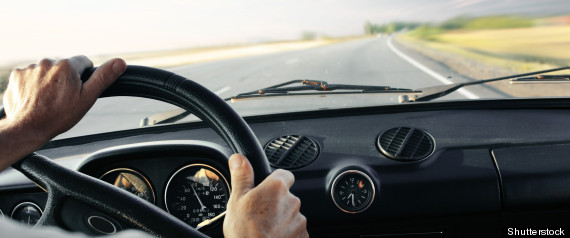
Here's another reason to make sure your snoring isn't sleep apnea.
According to a new study, people with sleep apnea -- a condition where a person stops breathing for periods of time throughout the night, leading to disrupted sleep -- were more likely to fail a driving simulator test and also reported falling asleep while driving more than people without the sleep condition.
The study, conducted by researchers from the the University Hospital in Leeds and presented at the Sleep And Breathing Conference in Berlin, included two parts. The first part tested the driving ability of 133 people with untreated sleep apnoea, as well as 89 people without the condition. Each participant underwent a 90-kilometer (approximately 56-mile) driving simulation, where they were tested for things like time it takes ti compete the course, time spent driving in the middle lane, and unprovoked car crashes.
Researchers found the participants with untreated sleep apnea were more likely to fail the test. Twice as many people with sleep apnea failed the test than people without the condition -- 24 percent versus 12 percent. Furthermore, several of the patients with sleep apnea couldn’t finish the test, had more unprovoked crashes and had more difficulty adhering to the clear driving instruction given at the beginning of the exam.
The second study also involved comparing the driving of people with sleep apnea with those without sleep apnea. The study participants -- 118 of whom had untreated sleep apnea and 69 of whom did not have the condition -- completed a questionnaire about driving behavior, and then did a 90-kilometer driving test in the simulator.
Thirty-five percent of people withe sleep apnea said they fell asleep while doing the driving test, and 38 percent of them failed the test. No one in the group without sleep apnea failed the test, but 11 percent of the these people admitted to nodding off while driving.
The findings have yet to be published in a peer-reviewed journal, so they should be considered preliminary. But considering more than 18 million Americans have sleep apnea, this information could prove useful in reducing the amount of accidents on the road that may be caused, at least in part, by the sleep condition.
The findings are also important considering rates of sleep apnea may be high in truck drivers, according to a recent study from Australia. And according to the Federal Motor Carrier Safety Administration, as many as 28 percent of truck drivers have the sleep condition. Two government panels also recently recommended that U.S. truckers who have a body mass index indicative of obesity be screened for sleep apnea.
Source: http://www.huffingtonpost.com/2013/04/14/sleep-apnea-driving-risk-drowsy_n_3061126.html